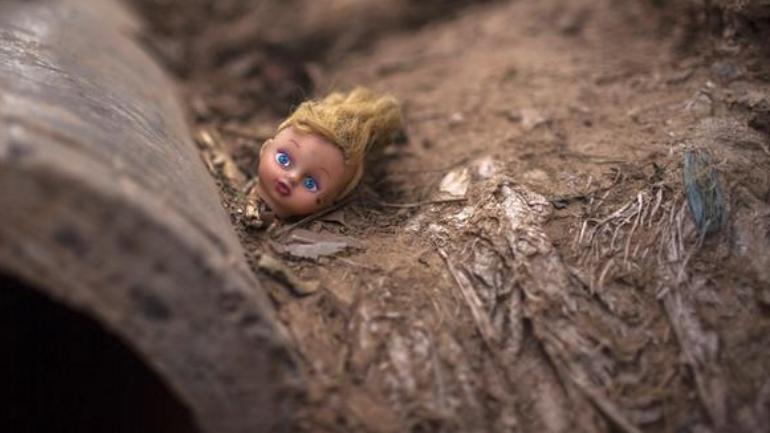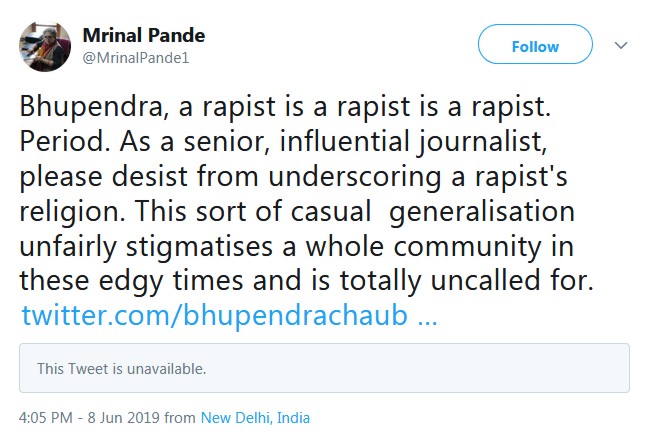Television and social media discourse over the past one week has touched an all-time low. Two gruesome incidents of rape in two cities, both in Uttar Pradesh (UP), Aligarh and Meerut, have elicited two diametrically different sets of response. Aligarh and Meerut.

Aligarh
The horrific rape and murder of a two-year old girl in Aligarh generated widespread protests, targeted hate, and a near riot like situation in Aligarh, despite the fact that the police took prompt action and arrested the accused. In a similar case in Meerut that occurred on June 4, there is no national debate or outrage and, barring a few Hindi publications, very few mainstream media houses have even carried the new. Could this be because in the case of Meerut, the victim child (as also the neighbouring accused) is also a Muslim?Hours of television time in one instance and a one column report, or silence, in the other. Why?
The Case of Aligarh: What Happened?
On May 30, a two-year old girl went missing from her house in Tappal village and a missing complaint was lodged by the parents the next day. Two days later, on June 2, her body was found at a garbage dump by a sweeper on the outskirts of Aligarh, UP. Her body was brutally damaged with her arms broken. Initially the police suspected a case of rape and murder, however, the post-mortem report ruled out rape.
Case Status:
Zahid and the other accused, Aslam, lived less than half a kilometre away and knew the victim’s family well. So brazen was their act of “revenge”, says the police, that they left the body at the garbage dump near their house. The police say Zahid had taken a loan of Rs. 50,000 from the girl’s grandfather and still owed him Rs. 10,000, over which the two had a fight two days before the child was kidnapped. Zahid, the girl’s family alleges, had threatened revenge for his “humiliation”. He allegedly got his partner to help him hide the body.
The Aligarh police say the child was strangled. Stringent charges under the Protection of Children from Sexual Offences (POCSO) Act have been added against the two accused and immediate arrests were made. Zahid’s wife and brother were also arrested on Saturday. Notably, the police have said that Aslam had allegedly raped his own daughter five years ago and had been, since, out on bail.
A senior police officer, Akash Kulhari, has also said that given the gravity of the case, it will also be investigated under the National Security Act (NSA), an anti-terror law that enables detention of suspects who pose a threat to national security for a year, without recourse to any remedy. Further, five policemen, including the station house officer, have been suspended for negligence after they failed to take any immediate action on the missing complaint filed by the victim’s family.
A six-member SIT has been formed to investigate the case and a female inspector has been appointed to carry forward the probe.
No advocate for the accused:
Public anger ran high and commercial television channels and their anchors went out on a limb to prove their ‘Hindu-ness.’
Senior journalist, Bhupendra Chaubey, had also posted a communal tweet in reference to the Aligarh rape case, which was deleted later after he faced severe backlash from his peers like veteran journalist Mrinal Pande who tweeted, “Bhupendra, a rapist is a rapist is a rapist. Period. As a senior, influential journalist, please desist from underscoring a rapist’s religion. This sort of casual generalisation unfairly stigmatises a whole community in these edgy times and is totally uncalled for.”

Under this mass media and social media spawned rage, the Aligarh Bar Association has, reportedly. said that no advocate will appear in court for the accused. Speaking to the ANI, Anoop Kaushik, General Secretary, Aligarh Bar Association, said, “We stand with the family of a 2.5-year-old girl who was murdered in Tappal and no advocate will appear in court for the accused. An advocate from outside will not be allowed to fight the case. We will fight for the child.”
Media Outrage:
The Aligarh rape case has led to an immense outrage on social media by politicians, celebrities and citizens alike with growing calls for the harshest possible punishment to the accused. Many politicians and celebrities took to Twitter to express their shock and anger. To give an example, Rahul Gandhi tweeted, “The horrific murder of a little girl in Aligarh, UP has shocked and disturbed me. How can any human being treat a child with such brutality? This terrible crime must not go unpunished. The UP police must act swiftly to bring the killers to justice.”
A Communal Angle?
While the brutality and insensitivity of the act cannot be debated, it is unfortunate that the crime has generated targeted hate against the community of the accused. Social media is full of such communal posts with people demanding the most stringent of punishment to the accused after emphasizing their names. One such post which is all over the social media is:

Riot Like Situation in Aligarh
Jumping on this bandwagon, a bunch of Hindutva supremacists, notably the non-locals, have further sensitized the atmosphere of the Tappal village, with reports of people in saffron gathering in the village and creating a curfew-like situation. Bajrang Dal, a Hindutva militant organisation, is trying to organise a mahapanchayat in Tappal village to further create communal fissures. Reportedly, more than 700 police and CRPF personnel have been deployed in the village in order to keep the situation under control.
Many Hindutva activists took to Twitter with a hash tag bearing the child’s name, resolute on underlining the religious identity of the accused, who happened to be Muslims.
Why then a deafening silence in the Meerut case then?
While it is now clear that the Aligarh case has become a battleground for communal politics, it is worth wondering why the media is completely silent on a similar crime that happened in Meerut! Let alone demand for justice, there are hardly any reports on the heinous crime and its investigation status. Barring a few Hindi publications, very few mainstream media houses are carrying the news of the Meerut case. Could this be because in the case of Meerut, the victim child is also a Muslim?
Reportedly, on June 4, an eight year old Muslim girl was kidnapped, raped and then murdered near Kashiram colony, Kharkhauda, Meerut. Two days later, locals found her body near a gutter opposite Anjul Palace in Madhavpura. The victim was the daughter of a local trader named Asif and went missing on June 4. The accused has been identified as Shaabad, who is a neighbour of the victim’s family and had allegedly taken her to a near-by shop, just 500 metres away from her house. Shaabad then tried to rape her and when she tried to raise a voice, he murdered her and threw the body in the gutter. The accused was arrested on Saturday and his family has been given a clean chit, who were earlier suspected of being a part of the crime. Further investigations are underway.
Media ignorance?
It is pertinent to note that the Aligarh rape case was reported by almost every media house, that too on the front page. In fact, it appears that the media has contributed to the riot-like situation in Tappal village with constant reports of demand for death penalty and other kinds of cruel punishments to the accused doing the rounds. The public is even using the social media to express its anger towards the Aligarh case.
Regrettably, the media has failed to give due attention to Meerut case. Although a few Hindi publications like Amar Ujala and Live Hindustan carried the Meerut incident, but was evidently not given enough coverage as the Aligarh incident. The question is why?
Is the Muslim identity of the Meerut victim a reason for its under-reporting and public apathy?
While the faiths of the accused in both cases are the same, the difference is that in the case of the rape of a young girl in Meerut the victim is also a Muslim. Unfortunately, it seems that this small difference has changed the entire outlook of the commercial media. Why has there not been enough support to the Meerut victim’s family as that of the Aligarh victim’s family? Why is the social media not flooded with anger? Why are people not demanding better protection policies for children now?
Are we heading towards a phase where the religious identity of the victim will define whether s/he gets justice? Have we reached a point where such brutal crimes will always trigger communal debates on commercial television? Will this section of the media now selectively report cases of crime depending on the religious identity of the victim and/or perpetrator?
Drawing parallels with the Kathua case
Last year, on January 10, 2018, the rape and murder of an eight year old Muslim girl, belonging to the nomadic Bakarwal community, in Kathua, Jammu and Kashmir had disturbed the entire nation. Eight people, including four police officials, were involved in this heinous act aimed at dislodging the Bakarwal community from the area, where it had been locked in tensions with local Hindus over the use of land, among other things.
The crime that allegedly took place inside a temple, was initially covered up, with the police acting only after nation-wide protests. However, the local Hindu residents held protests demanding that the accused be released. The leaders of the Bharatiya Janata Party, which was then part of the state’s ruling alliance, extended their support to the protestors. Further, the lawyers, linked to the Hindutva groups tried to physically obstruct the filing of the charge sheet. The Kathua case became a striking example of communal politics over which an innocent child had to lose her life.
Since then, the Hindutva activists have been on their toes whenever a crime is reported in which the accused is a Muslim and victim a Hindu. The Aligarh case reiterates this.
Despite several attempts of shielding the accused, the judiciary has ensured justice for the young victim with the special court in Pathankot convicting six of the seven accused. Those convicted include former revenue official Sanji Ram, Special Police Officers Deepak Khajuria and Surinder Kumar, two investigating officers – head constable Tilak Raj and sub-inspector Anand Dutta, Parvesh Kumar. Ram’s son Vishal Jangotra is acquitted, while an accused juvenile faces a separate trial. The quantum of sentence is likely to be announced at 2 pm today.
Everyday in India, the police register 293 cases of crimes against children on average, according to the last available national crime bureau data. Only a handful of such cases feature in news reports anyway. Why then the hue and cry in some cases and silences in others?